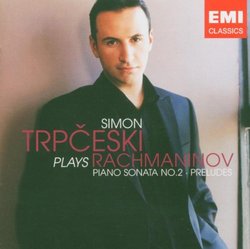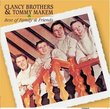| All Artists: Sergey Rachmaninov, Simon Trpceski Title: Simon Trpceski Plays Rachmaninoff Members Wishing: 2 Total Copies: 0 Label: EMI Classics Release Date: 2/1/2005 Genres: Pop, Classical Styles: Vocal Pop, Opera & Classical Vocal, Chamber Music, Forms & Genres, Sonatas, Historical Periods, Classical (c.1770-1830), Modern, 20th, & 21st Century Number of Discs: 1 SwapaCD Credits: 1 UPCs: 724355794321, 724555774321 |
Search - Sergey Rachmaninov, Simon Trpceski :: Simon Trpceski Plays Rachmaninoff
 | Sergey Rachmaninov, Simon Trpceski Simon Trpceski Plays Rachmaninoff Genres: Pop, Classical
This is only Simon Trpceski's second recording, but it sounds like the work of a far more experienced pianist. Although the opening Prelude (Op. 23, No. 2) starts things off with quite a bang, the pianist is quite up to th... more » |
Larger Image |
CD DetailsSynopsis
Amazon.com This is only Simon Trpceski's second recording, but it sounds like the work of a far more experienced pianist. Although the opening Prelude (Op. 23, No. 2) starts things off with quite a bang, the pianist is quite up to the challenge. He then goes on to offer a very well-planned recital, alternating familiar and unfamiliar items and offering a wide variety of moods. The producer has even varied the amount of time between tracks, adding to the impression that we are listening to a real recital. Best of all, Trpceski proves to be a gifted Rachmaninov player. He offers tonal variety in his playing which is sometimes even reminiscent of Richter--the highest praise this reviewer has to offer. And in the bombastic Second Sonata, Trpceski plays with such conviction and resource that he has convinced at least one previously-skeptical listener that this piece is actually worth hearing. Even if your collection is already well supplied with Rachmaninov piano music, this disc is still worth a try. --Leslie Gerber Similar CDs
|
CD ReviewsRachmaninov of majestic poise, technique David H. Spence | Houston, TX | 04/06/2005 (5 out of 5 stars) "The name Simon Trpceski, until I heard this disc, was but a name in passing this past year or so, among those of so many pianists, but no longer. This all-Rachmaninov program includes the 1931 revised edition of the Sonata No. 2, eight etudes (the famous C-Sharp Minor from the five pieces of Opus 3, five from Opus 23, two from Opus 32), and five transcriptions. Transcriptions for two of the composer's most familiar songs (Daisies or "Marguerites", 'Margaratki' if you will, and Lilacs or 'Siren'' from his Opus 38) are here and also the composer's last transcription - of a cradle song written by a young Tchaikovsky, possibly for the wife of Rimsky-Korsakov. The first track on this disc sets things immediately ablaze with the celebrated B-Flat Major Prelude from Opus 23, as several writers have noted already. What got me were the cascades of octaves and thirds at pianissimo, seamlessly from what had preceded it and the same way with the rapid filigree that spins off from everything toward the end. Lilacs (from the composer's Opus 21 collection of twelve songs) is turned into a shimmering Debussy-esque landscape of colours and half-tones, without losing any sense of line. Ironically, Daisies, with tune similar in character to that found in Sadko, Trpceski delivers with the greater melodiousness and with also a wild flourish (marked mezzo forte) at the end - whereas Ashkenazy, to opposite ends, opts for understatement. The composer's last set of songs from which Daisies come are settings of prominent Russian Symbolist poets of the period to music. In the two preludes that follow Siren', Trpceski engages us in controversially slow takes on each, and each featuring quite steeply terraced climaxes for both - especially on a more than usually despairing F-sharp Minor that opens Opus 23 (less defiant, as especially with the deleted Kocsis on Philips, than usual) and also for the gentle, Chopinesque G-Flat from Opus 32, the Orientalesque episode (again) toward the end of which wafts an abundance of fragrance here. I despair, however, for not being able to report that any risk-taking, such as cited above, makes for any vulgar playing in the least from this pianist. Trpceski is equally unabashed at taking on the climax of the celebrated D Major cavatina from Opus 23, though stopping well short of making Mario Lanza out of it, by the end of page 1, as with Van Cliburn. Add on the slow-tempo list the famous G Minor, during which Trpceski makes something truly haunting and spectral for the retransition to the reprise of the A section, and emotionally firm, reticent about his way of it the entire way. Somewhat lachrymose is the opening of the B-Flat Minor Prelude (strategically followed here by 'Margaratki') but midway challenges Kocsis (again) in bringing the daemonic element in it to the forefront as well. Flight of the Bumblebee spins off very deftly as it should, yet Gramophone is not alone in having found the Mendelssohn Scherzo from MND a bit heavy-handed. The transcription of the Tchaikovsky romance is played with gentle pathos, and just as weightlessly as so much before, breaks into the beautiful filigree that Rachmaninov has composed for a coda to it. The G-sharp Minor Prelude is brilliantly, coloristically dispatched at moderate tempo and without any showiness, a la Horowitz or Cliburn. The B-Flat Minor Sonata ends this disc in the same tonality as and much the same way as it had begun. Perish the thought that is for any lack of technique that Trpceski chooses the revised version (the more frequently played at competitions), over the original. This now could indeed be called its definitive interpretation on disc. The illusion that Trpceski builds of this music not having been truncated (or of perhaps being the original or a bowderlization instead) may seem a bit recidivist. He finds such fullness of expression, that it had to have been for the greater simplicity that Trpceski chose it - and he follows it entirely. It could perhaps serve as a referendum for those who hear a growing chill or fragmentation with late Rachmaninov a little more than perhaps did the composer himself. The unassuming display of bravura, the cliff dropping cascades of octave and thirds for the segue into the Recapitulation, played in such a way to hear them all as the simple legato harmonic progression they are is again almost terrifying, and without grandstanding by way of jumping over to the original version of the last four measures up to the Recapit, as at least almost all the bowdlerizations on disc give you, including the newest one on DGG. Similar happens with so much of the development section of the finale, and during which Rachmaninov rewrote some accenting (from what it is in the Original Version). Trpceski's poise and tastes are at such a high level, that rest assured, he would not have missed the right accenting (and which most notably Kocsis at least almost alone entirely gets), had he picked the original, and for which Horowitz both times uses the original notation. The slow movement is played with great tenderness, the right sense of being completely at rest, and beautiful tone, as are the Meno mosso sections of the two outer movements. A possible encore for this program could have been perhaps the G Major Prelude from Opus 32, a piece I was introduced to by the wonderful EMI recording by a young Geza Anda, playing of which Trpceski might remind a few listeners. There is nevertheless a full 69 minutes of playing time here - no reason at all for complaint. Richter or the composer may be the last word on simplicity for a few of the preludes here. This is, however, playing not to be missed. " Making sense of the second GEORGE RANNIE | DENVER, COLORADO United States | 02/14/2005 (4 out of 5 stars) "Down through the years I've heard many recordings and performances of Rachmaninov's second piano sonata; however, due to (I'm sure) something lacking within me, I've never been able to appreciate the work. This recording with Simon Trpceski "turned the light on" for me, and for once I actually liked the work and was emotionally moved by it. His technique is astounding and , to me for the first time, it did not sound as if the pianist was pounding the piano with his fists-the work's beautiful melodies were revealed to me for the first time.
The shorter works on the recording are also played very well, but the second sonata, for me is the standout. The sound and musical programming are also outstanding! " |

 Track Listings (16) - Disc #1
Track Listings (16) - Disc #1


